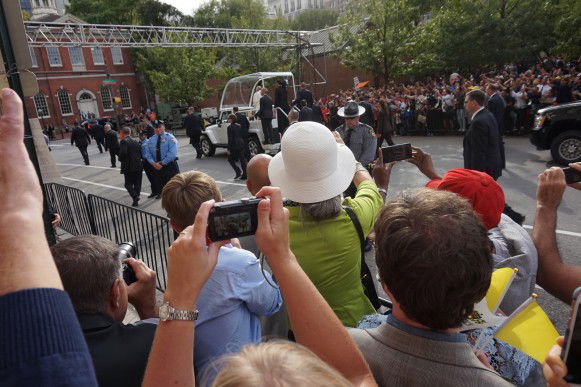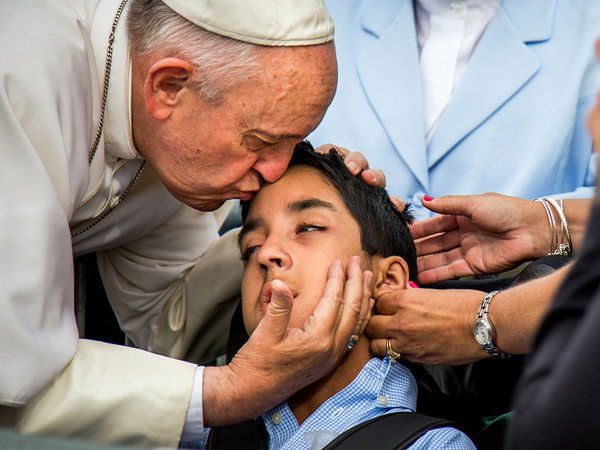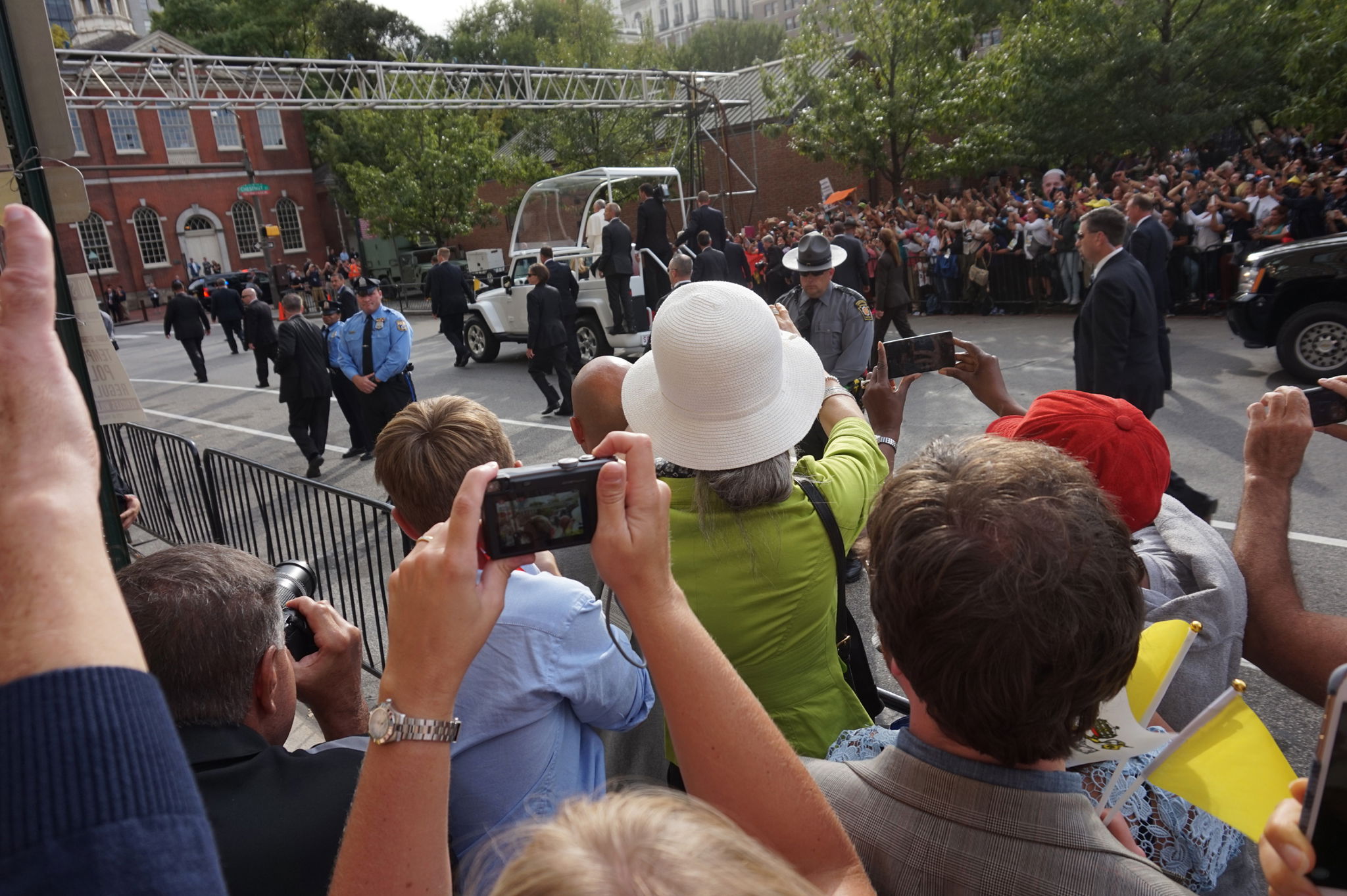America
Pope backs immigrants, says they will renew US

Philadelphia, Sep 27
Pope Francis in Philadelphia hailed the immigrants' contribution and said they "will help renew" society in the US.
The pontiff on Saturday showed his support for people from other countries who immigrated to the US, and assured that they will find their place and encouraged them not to lose hope whatever difficulties they might face, Efe news agency reported.
Francis, who earlier this week presented himself to President Barack Obama at the White House as a "son of immigrants", said to tens of thousands of people, "You bring many gifts to your new nation. Never be ashamed of your traditions."
"Many of you have immigrated to this country at a great personal cost, but with hopes of finding a new life. Do not be discouraged by the challenges and difficulties you must face," he said.
"When you contribute your talents, you will not only find a place here, but will help renew society from within," said Jorge Mario Bergoglio, who arrived on Saturday in Philadelphia, the last stop on his trip to the US.
The pontiff expressed his support in the context of a speech on religious freedom that he gave in Spanish at Philadelphia's Independence National Historical Park to a gathering of the US Hispanic community and representatives of other immigrant groups.
Speeches of the Pope in Philadelphia
USA – Philadelphia - 26.09.2015 – 10.30 Cathedral of Sts. Peter and Paul Holy Mass with the Bishops, Clergy, Men and Women Religious of Pennsylvania
This morning I learned something about the history of this beautiful Cathedral: the story behind its high walls and windows. I would like to think, though, that the history of the Church in this city and state is really a story not about building walls, but about breaking them down. It is a story about generation after generation of committed Catholics going out to the peripheries, and building communities of worship, education, charity and service to the larger society.
That story is seen in the many shrines which dot this city, and the many parish churches whose towers and steeples speak of God’s presence in the midst of our communities. It is seen in the efforts of all those dedicated priests, religious and laity who for over two centuries have ministered to the spiritual needs of the poor, the immigrant, the sick and those in prison.
And it is seen in the hundreds of schools where religious brothers and sisters trained children to read and write, to love God and neighbor, and to contribute as good citizens to the life of American society. All of this is a great legacy which you have received, and which you have been called to enrich and pass on. Most of you know the story of Saint Katharine Drexel, one of the great saints raised up by this local Church. When she spoke to Pope Leo XIII of the needs of the missions, the Pope – he was a very wise Pope! – asked her pointedly: “What about you? What are you going to do?â€. Those words changed Katharine’s life, because they reminded her that, in the end, every Christian man and woman, by virtue of baptism, has received a mission.
Each one of us has to respond, as best we can, to the Lord’s call to build up his Body, the Church. “What about you?†I would like to dwell on two aspects of these words in the context of our particular mission to transmit the joy of the Gospel and to build up the Church, whether as priests, deacons, or members of institutes of consecrated life. First, those words – “What about you?†– were addressed to a young person, a young woman with high ideals, and they changed her life. They made her think of the immense work that had to be done, and to realize that she was being called to do her part. How many young people in our parishes and schools have the same high ideals, generosity of spirit, and love for Christ and the Church!
Do we challenge them? Do we make space for them and help them to do their part? To find ways of sharing their enthusiasm and gifts with our communities, above all in works of mercy and concern for others? Do we share our own joy and enthusiasm in serving the Lord? One of the great challenges facing the Church in this generation is to foster in all the faithful a sense of personal responsibility for the Church’s mission, and to enable them to fulfill that responsibility as missionary disciples, as a leaven of the Gospel in our world. This will require creativity in adapting to changed situations, carrying forward the legacy of the past not primarily by maintaining our structures and institutions, which have served us well, but above all by being open to the possibilities which the Spirit opens up to us and communicating the joy of the Gospel, daily and in every season of our life. “What about you?â€
It is significant that those words of the elderly Pope were also addressed to a lay woman. We know that the future of the Church in a rapidly changing society will call, and even now calls, for a much more active engagement on the part of the laity. The Church in the United States has HOLY SEE PRESS OFFICE 18/2 always devoted immense effort to the work of catechesis and education. Our challenge today is to build on those solid foundations and to foster a sense of collaboration and shared responsibility in planning for the future of our parishes and institutions.
This does not mean relinquishing the spiritual authority with which we have been entrusted; rather, it means discerning and employing wisely the manifold gifts which the Spirit pours out upon the Church. In a particular way, it means valuing the immense contribution which women, lay and religious, have made and continue to make, to the life of our communities. Dear brothers and sisters, I thank you for the way in which each of you has answered Jesus’ question which inspired your own vocation: “What about you?â€. I encourage you to be renewed in the joy of that first encounter with Jesus and to draw from that joy renewed fidelity and strength.
I look forward to being with you in these days and I ask you to bring my affectionate greetings to those who could not be with us, especially the many elderly priests and religious who join us in spirit. During these days of the World Meeting of Families, I would ask you in a particular way to reflect on our ministry to families, to couples preparing for marriage, and to our young people.
I know how much is being done in your local Churches to respond to the needs of families and to support them in their journey of faith. I ask you to pray fervently for them, and for the deliberations of the forthcoming Synod on the Family. Now, with gratitude for all we have received, and with confident assurance in all our needs, let us turn to Mary, our Blessed Mother. With a mother’s love, may she intercede for the growth of the Church in America in prophetic witness to the power of her Son’s Cross to bring joy, hope and strength into our world. I pray for each of you, and I ask you, please, to pray for me
Celebration for families and Vigil of prayer
Dear Brothers and Sisters, Dear Families,
First of all, I want to thank the families who were willing to share their life stories with us. Thank you for your witness! It is always a gift to listen to families share their life experiences; it touches our hearts. We feel that they speak to us about things that are very personal and unique, which in some way involve all of us. In listening to their experiences, we can feel ourselves drawn in, challenged as married couples and parents, as children, brothers and sisters, and grandparents. As I was listening, I was thinking how important it is for us to share our home life and to help one another in this marvelous and challenging task of “being a familyâ€.
Being with you makes me think of one of the most beautiful mysteries of our Christian faith. God did not want to come into the world other than through a family. God did not want to draw near to humanity other than through a home. God did not want any other name for himself than Emmanuel (cf. Mt 1:23). He is “God with usâ€. This was his desire from the beginning, his purpose, his constant effort: to say to us: “I am God with you, I am God for youâ€. He is the God who from the very beginning of creation said: “It is not good for man to be alone†(Gen 2:18). We can add: it is not good for woman to be alone, it is not good for children, the elderly or the young to be alone. It is not good. That is why a man leaves his father and mother, and clings to his wife, and the two of them become one flesh (cf. Gen 2:24).
The two are meant to be a home, a family. From time immemorial, in the depths of our heart, we have heard those powerful words: it is not good for you to be alone. The family is the great blessing, the great gift of this “God with usâ€, who did not want to abandon us to the solitude of a life without others, without challenges, without a home. God does not dream by himself, he tries to do everything “with usâ€. His dream constantly comes true in the dreams of many couples who work to make their life that of a family. That is why the family is the living symbol of the loving plan of which the Father once dreamed. To want to form a family is to resolve to be a part of God’s dream, to choose to dream with him, to want to build with him, to join him in this saga of building a world where no one will feel alone, unwanted or homeless.
As Christians, we appreciate the beauty of the family and of family life as the place where we come to learn the meaning and value of human relationships. We learn that “to love someone is not just a strong feeling – it is a decision, it is a judgment, it is a promise†(Erich Fromm, The Art of Loving). We learn to stake everything on another person, and we learn that it is worth it. Jesus was not a confirmed bachelor, far from it! He took the Church as his bride, and made her a people of his own. He laid down his life for those he loved, so that his bride, the Church, could always know that he is God with us, his people, his family.
We cannot understand Christ without his Church, just as we cannot understand the Church without her spouse, Christ Jesus, who gave his life out of love, and who makes us see that it is worth the price. HOLY SEE PRESS OFFICE 20/2 Laying down one’s life out of love is not easy. As with the Master, “staking everything†can sometimes involve the cross. Times when everything seems uphill. I think of all those parents, all those families who lack employment or workers’ rights, and how this is a true cross. How many sacrifices they make to earn their daily bread! It is understandable that, when these parents return home, they are so weary that they cannot give their best to their children. I think of all those families which lack housing or live in overcrowded conditions. Families which lack the basics to be able to build bonds of closeness, security and protection from troubles of any kind. I think of all those families which lack access to basic health services. Families which, when faced with medical problems, especially those of their younger or older members, are dependent on a system which fails to meet their needs, is insensitive to their pain, and forces them to make great sacrifices to receive adequate treatment.
We cannot call any society healthy when it does not leave real room for family life. We cannot think that a society has a future when it fails to pass laws capable of protecting families and ensuring their basic needs, especially those of families just starting out. How many problems would be solved if our societies protected families and provided households, especially those of recently married couples, with the possibility of dignified work, housing and healthcare services to accompany them throughout life. God’s dream does not change; it remains intact and it invites us to work for a society which supports families.
A society where bread, “fruit of the earth and the work of human hands†continues to be put on the table of every home, to nourish the hope of its children. Let us help one another to make it possible to “stake everything on loveâ€. Let us help one another at times of difficulty and lighten each other’s burdens. Let us support one another. Let us be families which are a support for other families. Perfect families do not exist. This must not discourage us. Quite the opposite. Love is something we learn; love is something we live; love grows as it is “forged†by the concrete situations which each particular family experiences. Love is born and constantly develops amid lights and shadows. Love can flourish in men and women who try not to make conflict the last word, but rather a new opportunity.
An opportunity to seek help, an opportunity to question how we need to improve, an opportunity to discover the God who is with us and never abandons us. This is a great legacy that we can give to our children, a very good lesson: we make mistakes, yes; we have problems, yes. But we know that that is not really what counts. We know that mistakes, problems and conflicts are an opportunity to draw closer to others, to draw closer to God. This evening we have come together to pray, to pray as a family, to make our homes the joyful face of the Church. To meet that God who did not want to come into our world in any other way than through a family. To meet “God with usâ€, the God who is always in our midst.





































